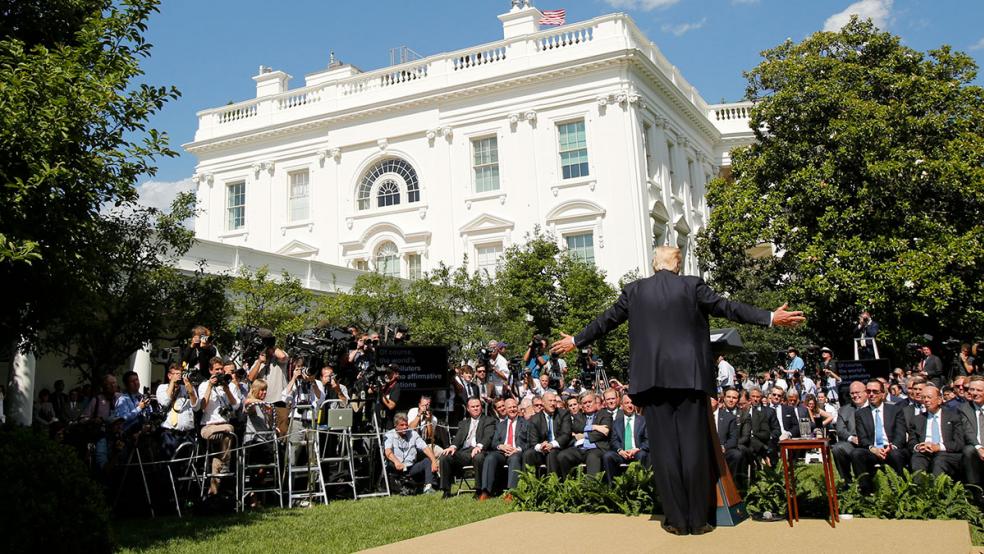President Trump’s announcement Thursday that he will pull the U.S. out of the international climate change agreement struck by 195 countries in Paris in December 2015 may eventually have serious consequences for the global effort to curb greenhouse gas emissions — but it already represents a serious blow to global perceptions of the United States. Here’s an overview of the major implications of Trump’s decision:
What It Means for Climate Change
The overall goal of the Paris accord was to keep the planet from warming above a “danger threshold” of 2 degrees Celsius or 3.6 degrees Fahrenheit. That is the point at which scientists predict the earth would be irreversibly locked into a future of severe and disastrous droughts, floods, rising sea levels, destructive storms and food and water shortages.
Related: Environmentalists’ Worst Fears About Trump Are Coming True
But the accord had many flaws, including the lack of any mandatory requirements or enforcement mechanism. The final agreement that emerged from hard bargaining by the world leaders would reduce greenhouse gas emissions by only about half the levels necessary to address the worst of the problem. The United States is the second biggest polluter in the world, behind China, and was expected to achieve one-fifth of the overall goal in reducing heat-trapping carbon emissions that scientists blame for global warming.
Trump’s announcement may mean less progress is likely to be made toward that goal — but his broader environmental policies may have greater impact. Even if Trump had decided to remain in the Paris accord, there was virtually no chance the administration would aggressively attempt to fulfill U.S. obligations under the deal. Since taking office in late January, Trump has systematically sought to repeal Obama administration carbon dioxide and methane gas emissions standards and sought major budget cuts and staffing reductions at the EPA. In late March, he signed an executive order aimed at reviving the coal industry by nullifying the Clean Power Plan, which is being challenged in court by state Republican officials and energy executives.
A recent analysis by Climate Action Tracker, an on-line climate change research organization, says that Trump’s hostile policies towards climate change reduction are projected to “flatten U.S. emissions” rather than continue their downward trajectory.
Related: Trump’s Rollback on Clean Air and Water Rules Could Raise Health Care Costs
At the same time, while Trump appears eager to reverse or obliterate Obama’s policies, many companies and utilities have already instituted changes designed to limit their carbon emissions, to get ahead of the regulations. Foreign governments or U.S. states such as California and New York may force multinational corporations and local businesses to stick to tougher environmental standards.
What It Means for U.S. Leadership
At the same time that Trump is raising doubts about his commitment to NATO and other long-time U.S. allies as he explores relations with Saudi Arabia and Russia, he may also be ceding to China and India a leadership role on the environment that could have lasting consequences for the perceptions of U.S. stature around the world.
The immediate impact of Trump’s decision is likely to weaken the international alliance that had looked to the United States for leadership on global warming issues and to call into question this country’s credibility in negotiating new international deals going forward.
By torpedoing the international agreement aimed at reducing 2015-level carbon emissions by 26 percent to 28 percent over the coming decade, Trump now stands virtually alone with the leaders of Syria and Nicaragua in opposing what President Obama deemed the last “best hope” of averting a global environmental catastrophe in the coming years.
Related: Trump Suffers a Rare Setback in War on Environmental Protections
During an afternoon address today in the White House Rose Garden, Trump said he would be willing to reopen talks on an agreement more favorable to U.S. economic interests.
“We’re getting out,” Trump said, “but we will start to negotiate and we will see if we can make a deal that’s fair. If we can, that’s great. If we can’t, that’s fine.”
Italy, France and Germany dismissed the idea of renegotiation. "We deem the momentum generated in Paris in December 2015 irreversible and we firmly believe that the Paris Agreement cannot be renegotiated since it is a vital instrument for our planet, societies and economies," Italian Prime Minister Paolo Gentiloni, German Chancellor Angela Merkel and French President Emmanuel Macron said in a joint statement.





